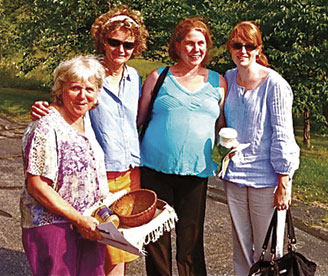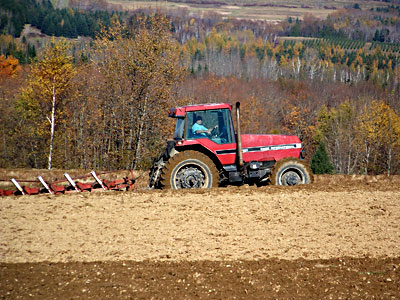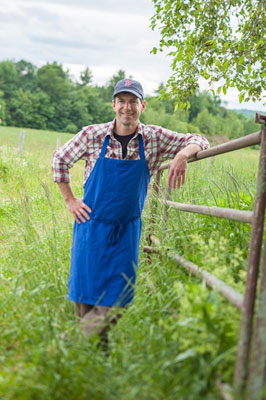 |
| From left to right: Bonnie Rukin, Linzee Weld, Marada Cook and Gray Harris, all active in Slow Money Maine. Photos courtesy of Slow Money Maine. |
By Jo Anne Chester Bander
May 15, 2013, was a glorious Maine spring day with sun streaming on newly leafed trees at Augusta’s Viles Arboretum when more than 80 individuals gathered under the Slow Money Maine umbrella – a must-attend event for those seeking information on capital investments in Maine’s sustainable agriculture and food product system. The goal: to hear presenters, make connections and learn how to participate in Slow Money Maine (SMM). Attending were investors, nonprofit leaders, individuals interested in new ventures and those seeking funds for expanding operations or for start-ups – and Bonnie Rukin.
How It Started
Rukin, who previously owned and farmed the Maine organic Sand Hill Farm and was a MOFGA president, launched SMM in 2010. It is one of 17 local chapters affiliated with the national organization, Slow Money, which Woody Tasch started in 2008 to organize investors and donors to make capital available to grow sustainable agriculture.
Rukin attended the first Slow Money gathering at the Santa Fe Farmers’ Market in September 2009 and returned to Maine with a vision of what could happen by bringing together a wide network of individuals interested in investing financially in small food enterprises, organic farms and local food systems. She convened a focus group of some 20 leaders in the sustainable agriculture community who identified the need for easier access to investment capital for such infrastructure as trucking, slaughterhouses and mills.
SMM is neither a nonprofit nor a venture capital fund. It’s not incorporated and doesn’t have its own budget or headquarters. Rukin calls it a “facilitator of connections” – among farmers, entrepreneurs, investors and philanthropists who strengthen Maine’s sustainable food system through cash and support.
“We convene meetings,” says Rukin, who coordinates the alternate month gatherings and, this year, a first regional gathering in May in Portland, called “Grow It! The New Food Economy.”
“We connect people to each other and we help to catalyze the flow of funds to help support people in their endeavors,” Rukin explains.
Most of the work goes on outside the networking events where people connect across sectors and where fund seekers pitch their ideas. SMM’s website (www.slowmoneymaine.org) and email blasts link people and make the loan application process accessible. SMM communicates about investment sources, technical assistance and fundraising approaches, such as crowd funding using Kickstarter (www.kickstarter.com) or Indiegogo (www.indiegogo.com).
 |
| Dave Ouellette has diversified the family farm in Aroostook County and is now growing certified organic grains. Connections he made through Slow Money Maine have helped. |
Starting in 2010 Rukin and colleagues, including Eleanor Kinney, Linzee Weld and Chris Hallweaver, began connecting investors with enterprises highlighted at SMM gatherings and through its outreach, including Somerset Grist Mill, Maine Organic Milling, Morning Dew Farm, Heiwa Tofu, MOO Milk and Thirty Acre Farm.
While SMM now has a part-time staff person through a grant from Maine Community Foundation, Rukin and her volunteer colleagues steer SMM and its growing activities. Since SMM’s inception they have placed 114 loans totaling $2.9 million; 71 grants totaling $2.1 million; and 18 equity investments totaling $3.66 million, for a total of $8.7 million. The majority of funds, $5.8 million, went to 12 infrastructure businesses. Individuals account for $7.1 million of the investment capital.
Affiliated Investment Clubs
Kinney and Weld got involved with SMM in 2010. At early SMM meetings with Russ Libby, then MOFGA’s executive director, and Marada Cook of Crown O’ Maine Organic Cooperative, they recognized that a microloan fund could help small ventures access loans for working capital, purchasing a piece of equipment, buying in bulk and similar needs.
Hallweaver came up with the idea to organize like a stock investment club, and by the spring of 2012, they brought in additional investors and created No Small Potatoes. The investment club makes loans of up to $5,000 in three cycles a year to farms, fishermen and the businesses they supply using a simple promissory note at 5 percent over 1 to 3 years (www.nosmallpotatoesinvestmentclub.org).
Now with a pool of some $100,000 and 18 investors, it was the first such investment club in the United States and has been copied by nine other clubs – including Maine Organic Lenders, which gives low-cost loans of $5,000 to $25,000 to farmers, food processors and distributors on a rolling basis (www.maineorganiclenders.org).
Three Success Stories
David Ouellette grew up on Ouellette Farms, his family’s 400-acre potato and grain farm in St. David, in Aroostook County. He moved downstate in 1996 and returned in 2004 to find his retired father leasing 55 acres to (now deceased) Jim Cook, founder of Crown’ O Maine.
With Cook’s encouragement Ouellette returned to his roots eight years ago, renamed the farm Lake Shore Farms, went organic and planted 7 acres of oats to “wake up the earth after it lay fallow in grass for ten.” His father and brother help with the harvest, and he sells mostly to Aurora Mills and Organic Valley.
This season Ouellette will plant and harvest 330 acres – 75 of rye and triticale at the encouragement of Amber Lambke of Somerset Grist Mill in Skowhegan, and the rest in oats and barley.
 |
| Ben Slayton is creating more markets for Maine farmers raising pasture-based livestock. |
In 2011, Hallweaver brought Lake Shore Farm’s capital needs to the Slow Money network. Rukin was able to connect Ouellette to a number of individuals, to Maine Organic Lenders and, most recently, to the MOFGA loan fund to finance his yearly working capital needs at favorable terms as well as other projects such as the grain silos he added in 2013. Ouellette had the opportunity to expand sales by providing cleaned grain; Hallweaver and Rukin produced an anonymous $10,000 grant for him to purchase a 1947 refurbished grain-cleaning machine.
Ouellette could tap commercial banking institutions at higher cost and less favorable terms, but says “the SMM network makes it easy on the farmer to get funds to grow his business.”
Lynne Rowe knew she would eventually launch a food-related business combining her love of cooking and commitment to locally grown organic food. About 18 months ago she founded a niche tortilla business, Tortilleria Pachanga, that sources Maine organic corn. Using techniques she learned living in Mexico 20 years ago and more recently with Michoacán women and a pair of factory owners in Oaxaca, she knew how to make a quality tortilla with hand-ground corn and a grill.
Rowe started experimenting with Maine corn sourced through Crown O’ Maine and growers such as Songbird Farm in Starks while stalking a tortilla production machine on eBay so that she could produce at a profitable scale. Using savings and other resources, she bought the machine and leased space in a commercial building in Portland; she still needed additional capital for her mid-February launch.
Rowe obtained $15,000 in working capital from an Indiegogo campaign; a $15,000 loan from the Portland Economic Development Corp; and dug deeper into family resources. Through SMM Rowe accessed a network of business people who have supported her with their expertise during her start up. Now in operation, Rowe is building sales and becoming comfortable that she can produce and deliver commercial quantities of quality tortillas. A few more good accounts, such as her existing one at Rosemont in Portland, should get her to sustainability.
Brendan McQuillen and Brady Hatch of Morning Dew Farm were farm apprentices in Washington state after meeting in college, and then farmworkers in Florida for a season. When the lease on the Hatch family property where Brady had been raised – 26 acres along the Sheepscot River in Newcastle – was up for renewal, they took over the property, and it is now a MOFGA certified organic vegetable farm.
The first three years they supported themselves with other jobs; they then transitioned to part-time and off-season work until 2011, when they became full-time farmers. They now sell to their 100-member summer CSA, 45-member winter CSA, to specialty markets and restaurants, and at the Damariscotta Farmers’ Market.
They have regularly sought business planning services from Coastal Enterprises Inc. (CEI) and followed a CEI business advisor’s counsel not to pay cash for multi-year investments. By assuming some debt, they could devote more attention to their farming business.
To increase farm income by expanding their winter CSA (Community Supported Agriculture) and sales to other accounts, they needed capital. In 2012 a $5,000 loan from No Small Potatoes funded a small high tunnel and a larger, better-insulated cooler, allowing increased swing-season product. In 2013 they borrowed $5,000 from No Small Potatoes for a wash station and equipment improvements to support expanded production from off-site acreage.
Hatch has found “for the local-minded farmer, borrowing from SMM is the perfect fit, because we support the multiplier effect of locally sourced dollars funding local businesses selling to their local communities.”
How Links Happen
Each SMM meeting features presenters, including the following at that May 2013 meeting.
Barbara Brooks of Seal Cove Farm in Lamoine, a producer of quality goat milk for more than 30 years, was seeking $25,000 to construct an earth-bermed cave for the “affinage” aging and finishing of 5,000 cheeses at a time instead of the current 500 of her popular and profitable farmstead cheeses. She heard after her presentation that potential investors were interested in her cave, but she deferred construction due to failure of some farm equipment. In February 2014, Rukin matched Brooks with an anonymous donor, and Brooks borrowed $4,000 on a simple promissory note to replace a water heater. With a stronger economy and new adaptations on the farm, she is beginning to reconsider seeking financing for the cave.
Ben Slayton of Farmers’ Gate, a retail butcher shop and market in Wales, Maine, works with more than 20 local, pasture-based livestock farms. He wants to enable those farmers to spend more time farming – possibly increasing production – as he does the marketing – increasing the availability of Maine-grown foods for customers.
Through SMM, Slayton connected with Jordan’s Farm of Cape Elizabeth, which sells products from its own and other Maine farms. Slayton sought $55,000 to open another market in partnership with Jordan’s. He didn’t get investors after his SMM presentation but did get technical assistance and business strategy suggestions that helped Farmers’ Gate and Jordan’s create a simple partnership. They expect to open their full-scale Maine meat and produce grocery store this summer in South Portland.
While Slayton has received financial support for Farmers’ Gate from Efficiency Maine, No Small Potatoes and CEI, he hopes the new South Portland store will interest SMM investors.
Joel Alex of Blue Ox Malthouse LLC, a malting start-up, sought $25,000 for help with designing and building a malting facility in Skowhegan. While no investors surfaced from the May 2013 SMM meeting, he believes his presentation attracted mentors and consultants who helped him refine his concept and leverage small grants and training opportunities valued at more than $40,000. Funding for a feasibility study, training, travel and start-up came from Maine Technology Institute (MTI), Maine Grain Alliance, the Libra Future Fund and Maine Center for Entrepreneurial Development. Alex is already sourcing grain from Aroostook and Somerset Counties and began piloting malt production in 100-pound batches in February 2014.
John D’Anieri and Joe Grady of Harpswell Coastal Academy (HCA) sought some $30,000 in working capital for The School House Café to serve locally sourced breakfasts and lunches in Harpswell; to be a gathering spot for the community; to provide school lunch, breakfast and snacks; and to be an incubator and internship/training program for HCA students. Soon after their presentation, two individuals offered technical assistance. One had been in the food business and the other is an attorney. They helped draft documents allowing the Café to apply to the IRS as a L3C low-profit limited liability company. Three investors then provided a total of $35,000 for start-up costs at 3 percent interest for three years. The Café opened in December 2013.
John Piotti of Maine Farmland Trust (MFT) reported on MFT’s use of “slow money” to help protect farmland and support farmers – particularly its buy/protect/sell program, which protects vulnerable farmland and then places that land into the hands of new farmers at affordable prices. MFT has used more than $2.8 million in SMM investment (coupled with foundation money and bank funds) for that program, protecting 8,959 acres and creating new opportunities for 38 farmers. As sales replenish the money, MFT uses the funds again. MFT’s farm viability program also identified a grass-fed beef operation and cheese maker and supported them with $205,000 from SMM investors.
Building the Future
Signs of SMM’s impact are spurting throughout the state, from Northern Girl’s new plant in Aroostook County that processes and packages Maine-grown produce, to Skowhegan’s Somerset Grist Mill and Belfast’s Heiwa Tofu. But SMM is much more than money: It’s a network that advocates for the sector, connects investors, provides technical assistance, and enables loan recipients to source from and grow for one another.
“Working with SMM is working with nice people who understand what you are going through,” says Ouellette. “They are driven by vision, not by money.”
About the author: JoAnne Chester Bander, a resident of Coral Gables, Florida, and Spruce Head, Maine, is involved with and writes about the sustainable agriculture movement in both places.
